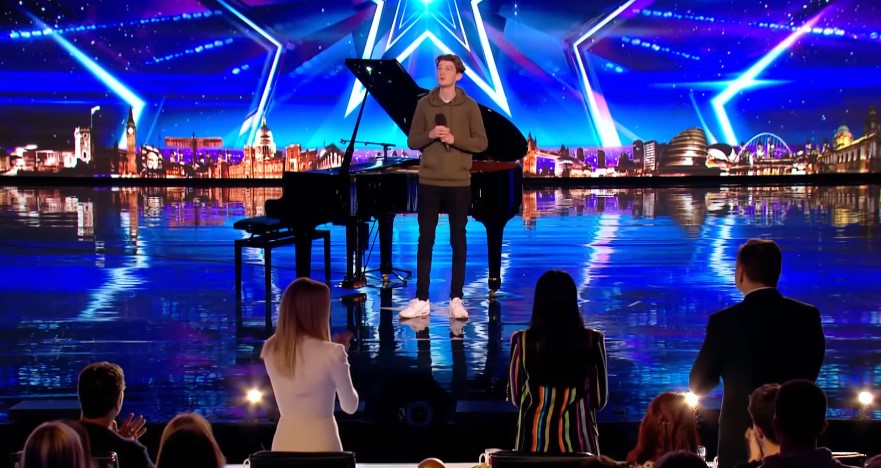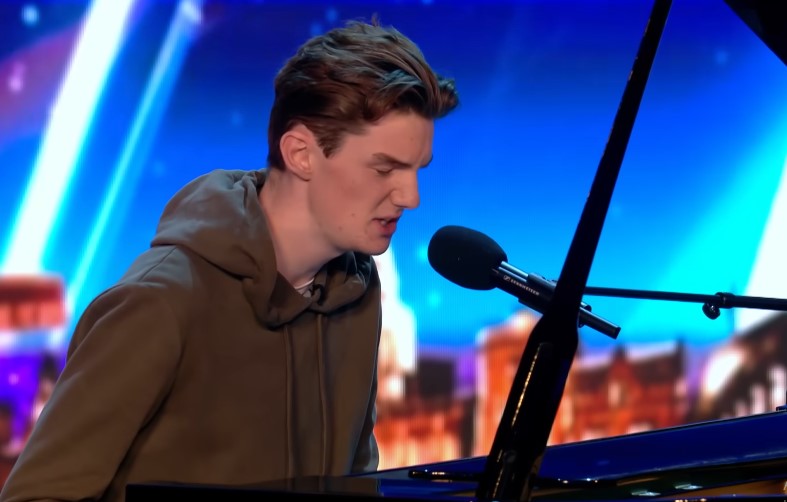When Harry first stepped onto the stage, he was overwhelmed by a mixture of excitement and nerves. At sixteen, the idea of performing in front of a large crowd was terrifying enough on its own, but Harry wasn’t just there to sing—he was there to bare his soul. The spotlight felt like a weight on his shoulders, but he knew this moment meant more than any performance he had ever done.
For the past few months, Harry had been living with a deep sadness. His grandmother, the woman who had always been his greatest supporter, had been diagnosed with Alzheimer’s disease. It started slowly, with small moments of forgetfulness, but soon, the disease began to take away pieces of her. Harry had watched helplessly as his vibrant, witty grandmother, who had once been the center of the family, slowly faded away. It hurt him deeply, especially since he had been so close to her. She had always been the one to listen to his music, the first one to praise his talents, and the one who would remind him that he could do anything.
One day, Harry sat at his desk in his room, strumming his guitar absently, when a thought struck him. He could write a song for her. Not just any song, but one that would capture all of his feelings—his love, his sadness, and his hopes for her. He could share his heart with her through music, something she had always understood better than words alone. And so, he began to write.
The song came together in a few days. It wasn’t perfect, but it was honest, and that was all that mattered. He wrote about the memories he held of her—how she had taught him to play the piano, how she would smile and laugh with him when they sat together, sharing stories. He wrote about the pain of watching her forget those memories, of watching her become a stranger in her own home. But most of all, he wrote about his unwavering love for her, and his hope that no matter what, she would always remember the bond they shared.
The day of the performance arrived. Harry’s heart pounded in his chest as he waited backstage, his hands trembling. He had practiced the song a thousand times, but this was different. He wasn’t just performing for the judges or the audience. He was performing for her, for the grandmother who no longer recognized him the way she once had. He wanted to reach her, even if it was through music, even if it was just for a few moments.

As he walked onto the stage, the bright lights blinded him for a moment, and he squinted into the sea of faces. The crowd was silent, waiting. Harry took a deep breath, positioned his guitar, and began to play.
At first, his voice was shaky, but as he sang, the raw emotion he had poured into the lyrics filled the room. His words trembled with vulnerability, and the pain in his heart was palpable. He sang about the way his grandmother had once held him close, her soft hands brushing his hair as she whispered, “You’re special, Harry. Never forget that.” He sang about the emptiness he felt when she no longer remembered those words. And he sang about the hope that she would somehow hear his love through the music, even if she couldn’t recognize his face anymore.
As the song progressed, Harry’s nerves began to fade, replaced by a surge of something stronger—a deep connection to the music and the emotions behind it. His voice grew stronger, more confident, and the audience could feel the sincerity in every note. His eyes were closed as he played, but he imagined his grandmother sitting in the front row, her eyes filled with pride as she watched him.
It wasn’t long before Harry noticed the tears in the eyes of the judges, and even in the faces of some members of the audience. He wasn’t sure if they were moved by his talent, or by the story that accompanied the song, but he didn’t care. He had done what he set out to do—he had shared his heart, and in doing so, he had reached them.
By the time he reached the final chorus, Harry’s voice was strong and clear, the words no longer just his own, but a message for everyone in the room. The song was more than a tribute to his grandmother—it was a testament to the power of love, to the way art can help us express the things we can’t always say aloud.
As the last note hung in the air, there was a long silence. Harry slowly opened his eyes and looked out at the audience. The room was still, the only sound the quiet, ragged breaths of people who had been moved by what they had just witnessed. And then, as if they couldn’t contain themselves any longer, the applause began. At first, it was tentative, but soon it grew louder, more passionate. Harry felt a wave of relief wash over him, and for the first time in months, he smiled genuinely, not out of nervousness, but out of pure emotion. He had done it. He had shared his grief and his love, and in doing so, he had created something beautiful.
The judges were the first to speak. “Harry,” one of them began, his voice thick with emotion, “That was one of the most powerful performances I’ve ever witnessed. Not just for the talent, but for the heart behind it. You’ve taken something deeply personal and shared it with all of us. That’s what true art is.”
Harry nodded, swallowing the lump in his throat. He had done what he came to do. But what moved him the most was the thought that, somehow, his grandmother might hear the song and know that she was still in his heart, no matter what.
As the applause continued, Harry stepped off the stage, his heart still racing but filled with an overwhelming sense of peace. He had poured his soul into the song, and in return, he had received something more precious than any award or recognition—a moment of connection that transcended words.
